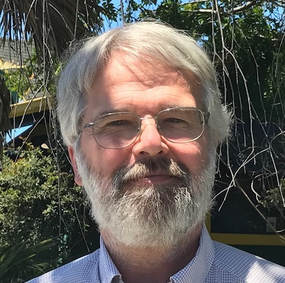Interview with Poet Jeff Burt
1. How does writing poetry nourish your creativity and center you?
My mind races, a stream. But poetry has line breaks, and that is continual reminder to me to focus on a word, a phrase, a breath, a story. We begin and end life as the poem described pricked and scored, but there comes a wonderful peace, a centering, when we are held physically as well as when enchanted. How much a line break in a poem, an image, an analog, slows my tempo, a rest stop in music brings me to focus on a note, and a slow breath brings me peace, resilience.
I often write in the twilight of morning or at night, transitional times. I write for that illumination that occurs when things are on the verge. It’s when I learn, when the race ends, watching one thing ebb and another flow and feel the same in myself.
2. What is the most important advice you have been given as a poet?
My father told me, to encourage my chores as a teenager, that “the sweep of speech should include the genuine broom.” That has stuck with me. It wasn’t simply writing about a tree, but planting them. It was enough to write about the homeless, but serving them. It wasn’t enough to say I loved, but to show the actions of love.
3. What is one of your favorite lines of poetry and why?
“To be excited about a cinder is to be excited about life.”
The line is from Jim Harrison’s Kooser called from Nebraska to say he’d found… The poem starts that Ted Kooser found a cinder from an old steam train on a railroad track from a time their fathers were stoking coal to feed a furnace, and then shifts to Harrison’s attraction to trains. The line is the closing line to the poem, and can stand by itself.
A cinder is a remnant of fire by coal, what we now disparage, but to Harrison a cinder was an honoring of the past, of power, travel, and beauty. The line reminds me to be a spent life.
Jeff Burt lives in Santa Cruz County, California, with his wife and a July abundance of plums. He works in mental health. He has work in The Monarch Review, LitBreak, Spry, Rabid Oak, NatureWriting, and won the 2017 Cold Mountain Review Poetry Prize.
My mind races, a stream. But poetry has line breaks, and that is continual reminder to me to focus on a word, a phrase, a breath, a story. We begin and end life as the poem described pricked and scored, but there comes a wonderful peace, a centering, when we are held physically as well as when enchanted. How much a line break in a poem, an image, an analog, slows my tempo, a rest stop in music brings me to focus on a note, and a slow breath brings me peace, resilience.
I often write in the twilight of morning or at night, transitional times. I write for that illumination that occurs when things are on the verge. It’s when I learn, when the race ends, watching one thing ebb and another flow and feel the same in myself.
2. What is the most important advice you have been given as a poet?
My father told me, to encourage my chores as a teenager, that “the sweep of speech should include the genuine broom.” That has stuck with me. It wasn’t simply writing about a tree, but planting them. It was enough to write about the homeless, but serving them. It wasn’t enough to say I loved, but to show the actions of love.
3. What is one of your favorite lines of poetry and why?
“To be excited about a cinder is to be excited about life.”
The line is from Jim Harrison’s Kooser called from Nebraska to say he’d found… The poem starts that Ted Kooser found a cinder from an old steam train on a railroad track from a time their fathers were stoking coal to feed a furnace, and then shifts to Harrison’s attraction to trains. The line is the closing line to the poem, and can stand by itself.
A cinder is a remnant of fire by coal, what we now disparage, but to Harrison a cinder was an honoring of the past, of power, travel, and beauty. The line reminds me to be a spent life.
Jeff Burt lives in Santa Cruz County, California, with his wife and a July abundance of plums. He works in mental health. He has work in The Monarch Review, LitBreak, Spry, Rabid Oak, NatureWriting, and won the 2017 Cold Mountain Review Poetry Prize.
